
|
 |
| Editor's note:
In the recently concluded London 2012 Olympics, Liu Xiang disappointed his fans again, leaving a collective sigh, regret and doubt in China, but no matter how Liu performed we cannot ignore his contribution to China's track and field. Liu is one of a few Chinese sports icons who have huge personal clout. China's sports industry has entered a new era in which the superstars themselves become the absolute focus of public attention. Compared with the gold medals and honors the Chinese team has gotten, sports stars play the role of inspiring people and enhancing the status of their sport in China. The China Daily website will bring our readers an overview of those stars who once were, currently are or in the future will become milestones to change China's sports demographic. Editor: Gao Qihui |
 |
| Yao Ming : China's ambassador | ||
|
When talking about the China's super sports stars, Yao Ming, the Chinese basketballer who made a real impact in the NBA, is undoubtedly named as the first world-class and most influential national and international sports star of China. A Yao phenomenon emerged as he gradually grew in the NBA. Yao became the first foreign-born player without US college experience to be drafted as the No 1 overall pick in NBA history. During his nine seasons with the Rockets, he achieved career averages of 19.0 points, 9.2 rebounds and 1.9 blocks per game in the 486 NBA games he played. The Houston Rockets center became a household name in China since becoming the top NBA draft pick in 2002. Yao has been selected to start for the Western Conference in the NBA All-Star Game eight times, and has been named in the All-NBA Team five times. [more]
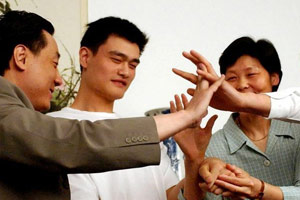 |
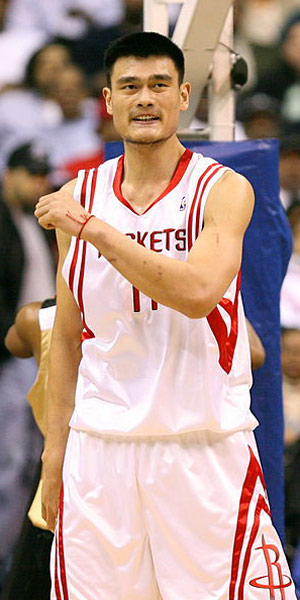 |
Yao phenomenon Yao's success sparked a nationwide craze for basketball. NBA China CEO David Shoemaker put a positive spin on Yao's bowing out of the game. It is said that Yao brought nearly 1.5 billion fans with him to NBA, which led to an explosive growth of basketball players in China. "Yao was a transformational basketball player, and a testament to the globalization of the game. There are 300 million people playing basketball here in China. We are the most popular sport in the country," Shoemaker said after Yao Ming announced retirement on July 20, 2011. China's basketball population was only 84 million in 2002, according to a reported released by East Star Sport. During his NBA career, Yao's influence went far beyond China to the whole of Asia, the US and Chinese from all over the world. He single-handedly changed the image of Chinese athletes abroad with his humility, modesty, social responsibility and smart thinking coupled with his stellar performances on the court. He became an unofficial ambassador for China, and did much to promote Sino-American cultural exchange. |
| Guo Jingjing : The Queen of Diving |
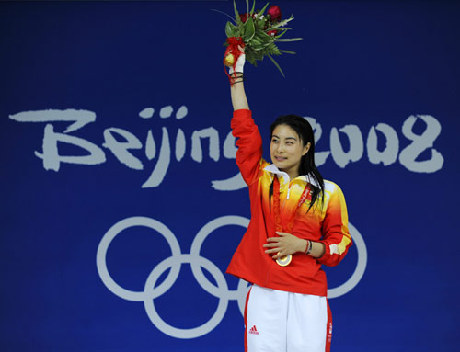 Why Guo is amazing |
Major achievements 2000 Olympic Games – 2nd 3m Springboard & Synchronized Springboard 2001 World Championships – 1st 3m Springboard & Synchronized Springboard 2003 FINA Diving Grand Prix – 1st 3m Springboard & Synchronized Springboard 2003 World Championships – 1st 3m Springboard & Synchronized Springboard 2004 Olympic Games – 1st 3m Springboard & Synchronized Springboard 2005 World Championships – 1st 3m Springboard & Synchronized Springboard 2007 World Championships – 1st 3m Springboard & Synchronized Springboard 2008 Olympic Games 1st Women's 3m Synchronised Springboard and Women's 3m Springboard 2009 World Championships – 1st 3m Springboard & Synchronized Springboard |
|
Guo Jingjing maybe the most well-known Chinese diver in the last decade. Guo used to be the leading member of the Chinese national women's diving team, and is dubbed as "The Queen of Diving" in China. Guo completed her fifth consecutive championship in the women's 3-meter springboard in 2009 World Aquatics Championships, becoming the first in the event's history. At the end of the Beijing Games, Guo became the most decorated female Olympic diver, and tied with fellow Chinese athlete Fu Mingxia, and Americans Pat McCormick and Greg Louganis with the most gold medals (four). Thanks largely to Guo's frequent exposure in the media, diving become a star event for Chinese sports fans. Guo was named as one of the 20 Best Female Athletes in 2008 by The Associated Press and the 2008 Best Female by FINA. The diver was not only well-known in the sports circle but also became a hot topic in the entertainment industry after she was reported to be dating Kenneth Fok, son of Timothy Fok from Hong Kong's rags-to-riches Fok family. Guo became the real No 1 female athlete in China. Even a sportswear with her signature was sold at the high price of 119,000 yuan at a charity auction. Guo's off-court popularity may be the highest of diving sports history.[More] |
Off-court spotlights |
|
May be the most pouplar mainland sports star in HK Guo Jingjing refused autograph for 'a little girl' |
|
|
 |
| Li Na: New image of China's tennis |
|
Being the first Asian to win the singles title of a Grand Slam tournament, it was Li Na who opened the door to tennis in China and even Asia. Her victory in the French Open was like a fairy tale and she has since been described as a "pioneer" national sports hero on a par with Yao Ming and Liu Xiang. In a nation where tennis has been a relatively unpopular sport compared to badminton and table tennis, nothing short of a Grand Slam champion can boost the process of tennis popularization. A record-breaking 116 million viewers in China witnessed the match, which was broadcast live on China Central Television (CCTV). The WTA even predicted that Li's victory will boost the Chinese tennis population to 300 million. Li's straight-shooting personality also won the adoration of young Chinese and foreign fans.[more] |
|
Chinese star claims her first tennis Grand Slam title, and Asia's too. Li Na set to open door for Asian tennis success Chinese Li Na's success at Roland Garros was a breakthrough for Asian tennis, which led to positive reactions and Asian expectations on forthcoming Wimbledon all over the tennis world. Li Na's victory catalyst for reform Li Na not only became the highest paid sportswoman with the first grand slam singles title in Asia, but challenged China's state training system. |
|
The historic victory has resulted in a surge of interest among children in the sport. "Parents say that their children are now really interested in tennis and they want them to play," said Fan, a tennis coach in Jiujiang, Jiangxi province. "It's unbelievable." Tennis is considered an elite sport in China and, while the number of players is growing, it still is less played than basketball, football, table tennis and other sports. In Sun Jinfang's eyes, Li's win is a huge boost to change that. "The victory can have a great effect on Chinese tennis. I'm sure it will lead to a re-evaluation of the sport and inspire more youngsters to play tennis," Sun said. As Li said Saturday after her win, "I hope that lots of kids see my performance and in their hearts they feel that one day they can be like me and do even better than me." |
| Liu Xiang: A Great Breakthrough |
|
China's world champion hurdler, Liu Xiang awoke the nation's long-sleeping interest in track and field events after he was the first man to ever win a men's track and field event for China. Before Liu won a gold medal in the men's 110m hurdle race with a record breaking performance at the Athens 2004 Olympic Games, Chinese people had never before shown such a strong interest in track and field events. . Liu has become a significant player in China's track and field events and the craze that has followed him is similar to Yao Ming's effect to China's basketball, both athletes prove how powerful a super sports star can be on promoting the development of a sport in China. |
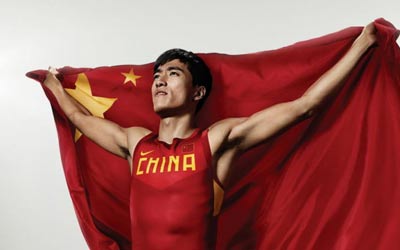 |
|
Always the public focus despite of fluctuation Liu has won 36 races, come second in 6, third in 3 others and has competed in a total of 48 international competitions since 2000. He is the first Chinese hurdler to break a world record, and win gold both at the Olympic Games and the World Championships. Almost all Chinese sports fans hearts synchronize with fluctuation of Liu's performance. Start the peak time In May 2004 at an IAAF Grand Prix race in Osaka, Japan, Liu beat Allen Johnson with a personal best record time of 13.06 seconds. He won the gold medal at the 2004 Athens Olympics with a world record-equaling time of 12.91 seconds. It was China's first men's Olympic gold medal in a track and field event. More significant, a lot of Chinese think that he defied the traditional thinking that Asian athletes couldn't compete in sprint events at the top level. "I want to prove to the world that Asians can run very fast," said Liu. Quickly following his success, Liu stirred a biding war among commercial sponsors. Liu's image frequently appeared on TV ads, commercial and charity activities. According to Forbes Chinese Edition, Liu earned 23 million yuan in 2005, a dramatically increase figure from his 1.6 million earnings in 2004. |
|
Down the first low point
Leading up to the Beijing 2008 Summer Olympics, Liu bore national expectations of a repeat victory on home soil. China deemed another gold medal from Liu essential for a successful Olympics. Disappointingly, Liu withdrew from the Olympic 110m hurdles event. He walked off the track after a false start by another runner in his first-round heat, leaving the crowd at the Beijing National Stadium in stunned silence, confusion and tears Despite of withdrawal, most Chinese fans believed Liu would come back. Liu still earned a historic 163 million yuan in 2008. No change of public back Liu to remain marketing phenomenon Sponsors vow to stand behind Liu Xiang We love Liu Xiang more than the gold medal |
|
A flash comeback After a 13-month absence because of his injury, Liu finally returned to compete at the Shanghai Golden Grand Prixin 2009. He finished second with a time of 13.15s, 0.01s behind first place.
In the final of 2010 Asian Games, a total of 70,000 gathered at the Guangdong Olympic Stadium where he won his third consecutive title in the 110m hurdles, breaking the Games record with a run of 13.09 seconds. According to the China Central Television, about 700 million people across the world watched this final on television. |
Fall again with less hope Sadly, four yeas after Beijing 2008 Olympics, Liu was once again hindered by injury and failed to complete in his heat at the London Olympics Games. He pulled his Achilles tendon while taking off and attempted to clear the first hurdle, but he crashed straight into it. Liu hop This time, more controversies were aroused following Liu's falling. Voices on Liu Xiang's fall |
| Ding Junhui: Bring Future for World Snooker |
| Who will be the next? | ||
|
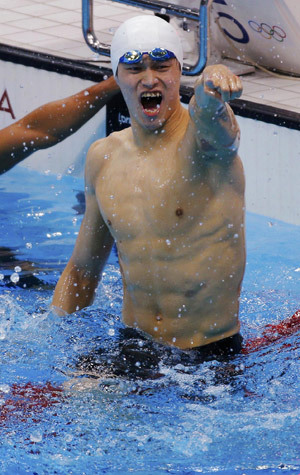 |
Sun Yang and Ye Shiwen Although Liu's fall in the London Olympics smashed the hope of millions of Chinese, they saw two rising stars in the swimming pool. Sun Yang and Ye Shiwen are pulling the nation's focus out of track and field to the pool, which is much less noticed due to the long absence of any champion-level Chinese swimmers. Both Sun and Ye showed their great potential in London by record-breaking performances and becoming the brightest stars of the Chinese delegation. Sun and Ye have the world's best fan |
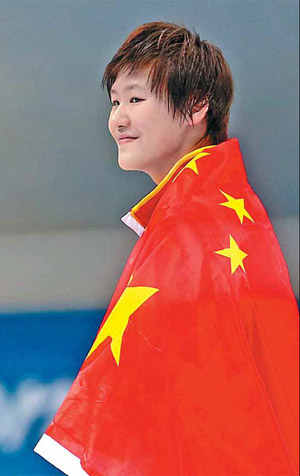 |